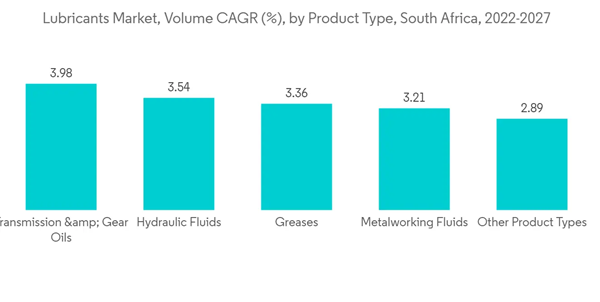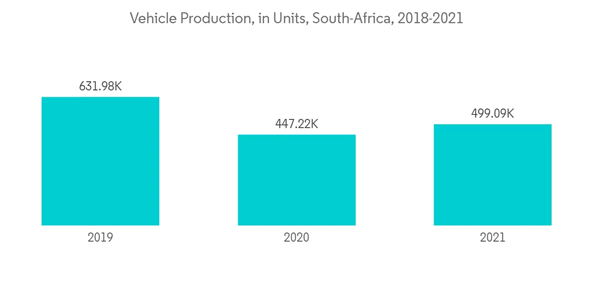The COVID-19 pandemic adversely impacted the market in 2020 due to various trade and operational restrictions. However, after the loosening of restrictions and the retraction of the pandemic in the latter half of 2021, the market recorded a positive growth rate due to the various end-user industries, such as automotive, heavy equipment, and others.
Key Highlights
- Over the medium term, the well-established automotive sector and increasing demand from the power generation sector are expected to drive the demand for the market during the forecast period
- The manufacturing activities in the counterfeiting industry, however, are expected to hinder the overall growth of the market.
- Growing demand for bio-lubricants is likely to provide opportunities for the South Africa lubricants market over the next five years.
- Botswana is expected to witness significant growth in the South African lubricants market during the forecast period.
South Africa Lubricants Market Trends
Engine Oil Segment to Dominate the Market
- Engine oils are widely used to lubricate internal combustion engines and are generally composed of 75-90% base oils and 10-25% additives.
- High-mileage engine oils are in demand lately, owing to the properties that help in the prevention of oil leaks and the reduction of oil consumption. Awareness regarding the benefits of using synthetic engine oil is also a key driver for the increased demand for engine oil in the region.
- Most light and heavy vehicle diesel and gasoline engines use 10W40 and 15W40 viscosity-grade oils, whereas, multi-grade oils, like 15W50 and 20W50, are used for aircraft engines.
- The South African automotive sector is the largest manufacturing sector in the region. According to NAAMSA, automotive sales jumped from 386,754 units in 2021 to 437,467 units in 2022, between January-October, indicating an increase of 13.1% year-on-year growth. The passenger cars segment observed growth of 19.8% during this period.
- As per the ITA, total local vehicle production is expected to cross 5,70,000 units by this year's end in the South African market.
- The increasing number of vehicles on the road will drive the demand for engine oil through the function of maintenance activity related to the service of on-road vehicles, thereby increasing demand for the lubricant market in the region.
- All these factors are likely to increase the demand for lubricants in South Africa during the forecast period.
Automotive Industry to Lead the Market
- The automotive industry is one of the largest markets for lubricants is expected to revive itself in accordance with the next phase of the automotive production and development program (APDP). This next phase is essentially South Africa's long-term master plan to induce growth in the automotive industry.
- According to the National Association of Automobile Manufacturers of South Africa (NAAMSA), new passenger and commercial vehicle sales in South Africa increased by 7.6% year-on-year to 41,019 units in June 2022. Further, in the first half of 2022, sales volume increased by 11.4% year-on-year to 253,442 units.
- Vehicle exports in South Africa rose by 26,733 units (9.9%) to 298,020 units in 2021, which were sent to 106 countries.
- As per the latest reports, in October 2022, domestic new-vehicle sales increased 11.4% in comparison to last year. The car rental industry accounted for 17.4% of car sales, with the tourism and leisure industry gearing up for the summer holidays.
- The EV market in South Africa is in the nascent stage, but efforts are being taken by the government to boost the adoption of EVs. In South Africa, the key electric vehicle models which are being considered by domestic consumers are Porsche Taycan, BMW i3, Jaguar I-Pace, Mini Cooper SE, Nissan LEAF, Ford Mustang Mach E, and others
- With the autmotive industry showing good promise of strong recovery and growth in the coming years, the demand for lubricants in the market is expected to pick-up during the forecast period.
South Africa Lubricants Market Competitor Analysis
The South African lubricants market is consolidated in nature. Some of the major players in the market include (not in any particular order) Shell Plc, BP Plc (Castrol), Engen Petroleum Ltd., TotalEnergies, and Astron Energy Pty Ltd, among others.Additional benefits of purchasing the report:
- The market estimate (ME) sheet in Excel format
- 3 months of analyst support
This product will be delivered within 2 business days.
Table of Contents
1 INTRODUCTION1.1 Study Assumptions
1.2 Scope of the Study
2 RESEARCH METHODOLOGY
3 EXECUTIVE SUMMARY
4 MARKET DYNAMICS
4.1 Drivers
4.1.1 Well Established Automotive Sector in South Africa
4.1.2 Increasing Demand from the Power Generation Sector
4.2 Restraints
4.2.1 Manufacturing Activities in the Counterfeiting Industry
4.3 Industry Value Chain Analysis
4.4 Porter's Five Forces Analysis
4.4.1 Threat of New Entrants
4.4.2 Bargaining Power of Buyers
4.4.3 Bargaining Power of Suppliers
4.4.4 Threat of Substitute Products
4.4.5 Degree of Competition
5 MARKET SEGMENTATION (Market Size in Volume)
5.1 Product Type
5.1.1 Engine Oils
5.1.2 Transmission and Gear Oils
5.1.3 Hydraulic Fluids
5.1.4 Greases
5.1.5 Metalworking Fluids
5.1.6 Other Product Types
5.2 End-user Industry
5.2.1 Automotive
5.2.2 Heavy Equipment
5.2.3 Metallurgy and Metalworking
5.2.4 Power Generation
5.2.5 Other End-user Industries
5.3 Province
5.3.1 Eastern Cape
5.3.2 Free State
5.3.3 Gauteng
5.3.4 KwaZulu-Natal
5.3.5 Limpopo
5.3.6 Mpumalanga
5.3.7 Northern Cape
5.3.8 North West
5.3.9 Western Cape
6 COMPETITIVE LANDSCAPE
6.1 Mergers and Acquisitions, Joint Ventures, Collaborations, and Agreements
6.2 Market Share(%) Analysis**
6.3 Strategies Adopted by Leading Players
6.4 Company Profiles
6.4.1 Astron Energy (Pty) Ltd
6.4.2 BP PLC (Castrol)
6.4.3 Engen Petroleum Ltd
6.4.4 Exxon Mobil Corporation
6.4.5 Fuchs
6.4.6 Shell PLC
6.4.7 Sasol
6.4.8 Blue Chip Lubricants (Pty) Ltd
6.4.9 Centlube
6.4.10 Flexilube (Pty) Ltd
6.4.11 Puma Lubricants (Puma Energy)
6.4.12 Rocol Lubricants SA
6.4.13 Q8oils (Kuwait Petroleum)
6.4.14 TotalEnergies
7 MARKET OPPORTUNITIES AND FUTURE TRENDS
7.1 Growing Demand for Bio-lubricants
Companies Mentioned (Partial List)
A selection of companies mentioned in this report includes, but is not limited to:
- Astron Energy (Pty) Ltd
- BP PLC (Castrol)
- Engen Petroleum Ltd
- Exxon Mobil Corporation
- Fuchs
- Shell PLC
- Sasol
- Blue Chip Lubricants (Pty) Ltd
- Centlube
- Flexilube (Pty) Ltd
- Puma Lubricants (Puma Energy)
- Rocol Lubricants SA
- Q8oils (Kuwait Petroleum)
- TotalEnergies










